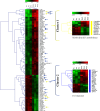Transcriptional changes in organoculture of full-thickness human skin following topical application of all-trans retinoic acid
- PMID: 24697191
- PMCID: PMC4265278
- DOI: 10.1111/ics.12121
Transcriptional changes in organoculture of full-thickness human skin following topical application of all-trans retinoic acid
Abstract
In this study, we developed an organoculture of human skin to investigate the effect of topical applied all-trans retinoic acid using a gene array approach. We could by using this approach confirm previous studies on genes activated by RA in keratinocyte monocultures and also provide new insights on genes that are relevant to RA-activation in human skin. The results in the present study show this model represent a valuable pre-clinical model for studying the effects of retinoids in skin.
Keywords: acne; cell culture; dandruff; elisa; genomics; proteomics; rosacea; skin culture; striae skin physiology; structure.
© 2014 Society of Cosmetic Scientists and the Société Française de Cosmétologie.
Figures



References
-
- Zouboulis CC. Retinoids–which dermatological indications will benefit in the near future? Skin Pharmacol. Appl. Skin Physiol. 2001;14:303–315. - PubMed
-
- Baldwin HE, Nighland M, Kendall C, Mays DA, Grossman R, Newburger J. 40 years of topical tretinoin use in review. J. Drugs Dermatol. 2013;12:638–642. - PubMed
-
- Griffiths CE, Finkel LJ, Ditre CM, Hamilton TA, Ellis CN, Voorhees JJ. Topical tretinoin (retinoic acid) improves melasma. A vehicle-controlled, clinical trial. Br. J. Dermatol. 1993;129:415–421. - PubMed
-
- Kligman AM, Willis I. A new formula for depigmenting human skin. Arch. Dermatol. 1975;111:40–48. - PubMed
Publication types
MeSH terms
Substances
LinkOut - more resources
Full Text Sources
Other Literature Sources

